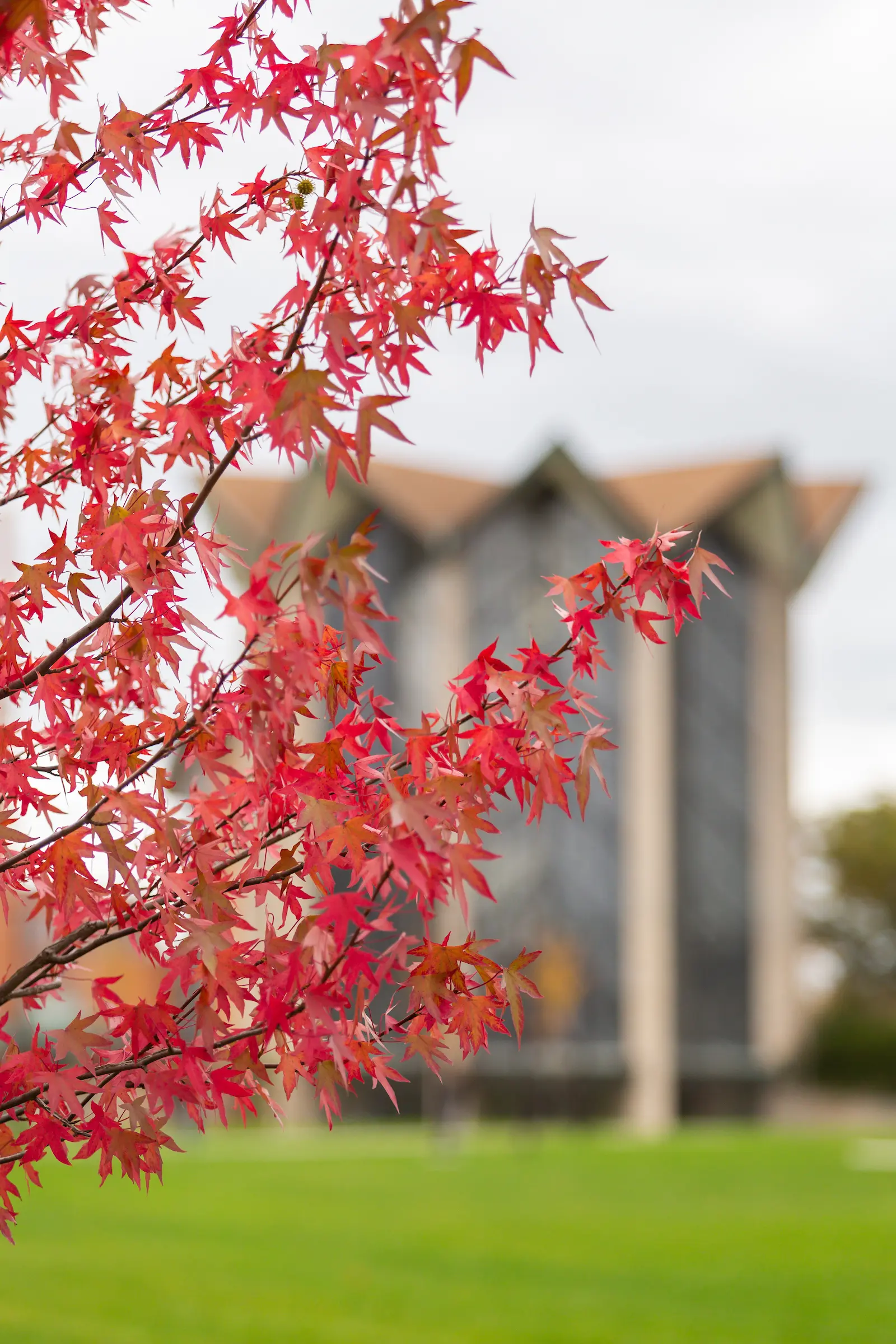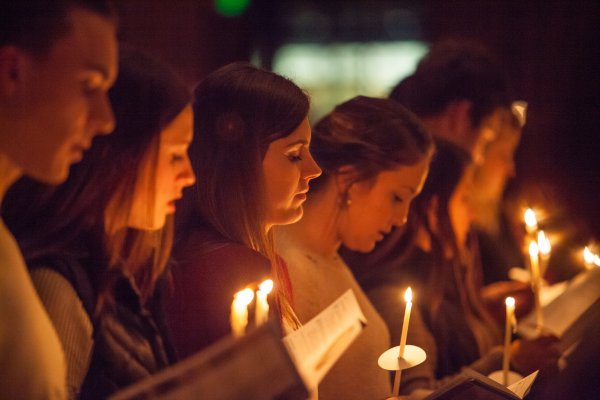Lilies and leaves and whatever else is beautiful

Consider the lilies of the field, how they grow; they neither toil nor spin, yet I tell you, even Solomon in all his glory was not clothed like one of these.– Matthew 6:28-29
Last April, when we were less than a month into the pandemic, Tyler Betustak (VU ‘20) offered a reflection on what he’d learned as a long distance runner and how he’d learned to apply it to daily life as a way of staying healthy and hopeful in times of great stress, deprivation, and uncertainty.
He said, “…if you start to run long distances … you’ll find that once you think about the ending once you stop thinking about where you are right now and start thinking about that end goal you’re essentially done …the only thing that you can fathom is the end and it makes every mile that much more painful … if you don’t take the time to pay attention to the things happening around you … and really pick out the good things instead of thinking so far down the road instead of thinking about the finish line, to take a second to look around and enjoy these things that God has provided for us was a lesson that I learned as I started to run.”
Tyler shared that he learned to apply that running lesson to his daily life through the experience of being a bone marrow donor. I encourage you to watch the video of his reflection here.
I’m not a runner so I’d not heard this bit of wisdom before and it struck me as odd considering that so-called successful people tell us to do things like “begin with the end in mind.” Goal setting seems to be a given. Tyler’s notion that we would do better to take our mind off the goal and place it elsewhere struck me as curious. So curious that I kept thinking about it.
Now we’re seven months into this thing and just over halfway through a break-less semester and the question of ends looms large in our minds. What’s more, many of us are in uncomfortable places, conversations about tightened budgets and program discontinuation, conversations about experiences of racism and a political season that is challenging our vocabulary of superlatives.
We’ll be fine when it’s all over. This is what we tell ourselves.
I’m coming around to Tyler’s way of thinking.
Typically, when I read Jesus’ words about lilies, I hear it as a teaching about priorities. These days, I’m also hearing them as guidance on attention, not just attention to the important and eternal things, like the reign of God in our lives, but attention to the small and beautiful things. Consider the lilies and the turning leaves and the music and the art and a friend’s kind gaze.
This is not a strategy of avoidance. We’re not simply sticking our heads in the sand. Instead, we are attending to all that is going on in our lives, both the stress-inducing and the wonderful. It’s about having all of the information and it’s about pacing ourselves for what must be done.
Finally, beloved, whatever is true, whatever is honorable, whatever is just, whatever is pure, whatever is pleasing, whatever is commendable, if there is any excellence and if there is anything worthy of praise, think about these things. – Philippians 4:8
Pr Jim
Oct. 14, 2020
Photo credit: Valparaiso University
University Pastor James Wetzstein and Deaconess Kristin Lewis take turns writing weekly reflections. You can contact Deaconess Kristin here and Pastor Jim here
- Archives of Devotional Writings from our Pastoral Staff
- Stinky Feet and the Love Commandment
- “HELP!”
- “Some Lent!”
- (Your vocation here) of people
- A call to courage for 2021
- A charming tale for over-achievers
- A Lesson On Beans … and Being
- A New Place
- A Point of Privilege
- A season of anticipation
- A Time of Dust
- Acquiring a peaceful spirit
- Advent = Hope
- All will be well
- Anastasis: the Greatest Story of God’s Saving Power
- Another kind of darkness
- Are we willing to cross the road for one another?
- As if we needed a reminder
- Beacons of hope
- Better Together
- Blessings As You Go
- Borderlands
- Can we learn to be happy?
- Carrying the COVID Cross
- Come and See
- Did Jesus really suffer?
- Doing without in a life of plenty
- Don’t miss this moment
- Exiles with Vision
- Fear not!
- Fear of the Lord
- Feeling at Home
- Finding Purpose in the Journey
- Finding Words for Times Like These
- Forgiving others – and ourselves
- Getting ahead with Jesus
- Getting down on Jesus’ level
- Getting through this together
- God is not overwhelmed
- Good Friday
- Grief & Graduation
- Have yourself a merry little Christmas — somehow
- Holy Week and Taking Out the Trash
- Holy Week: The aid station late in the semester
- Hopes & Dreams vs Life in the Wilderness
- How do you keep from giving up hope?
- How glad we’ll be if it’s so
- I almost slipped
- Imagining Eternity
- In a time of uncertainty, these things are certain
- In everything, grateful
- In praise of plans B … C … D …
- In the midst of grief, God will bring life
- Is there such a thing as being too forgiving?
- It’s a Three Day Weekend!
- It’s In the Bag
- It’s What’s Happening
- Jesus among us
- Killing off our future selves
- Knowing a Good Thing When We See It
- Lessons in fire building
- Let there be light!
- Let us work for real wellness in our communities
- Life Is a Highway
- Lilies and leaves and whatever else is beautiful
- Living in the Present
- Naming our demons
- O Lord, you know I hate buttermilk
- Of Fear and Failure
- On Christian Unity: When we’re not one big happy church
- On the Bucket List
- On the day after the night before
- Overwhelmed
- Persistent and Extravagant
- Pray and Let God Worry
- Praying for Reconciliation
- Preparing for the world to be turned rightside up
- Recovering from an Epic Fail
- Reformation calls for examination
- Remembering among the forgetful
- Rest
- Rest is Holy
- Right where we are
- Seeing beauty in brokenness
- Signs of Love
- Starting Small
- Still in the storm
- Surprisingly Simple: Breathe!
- Taking a Break from the Relentless
- Talking ourselves into it
- Thankfulness leads to joyfulness
- The Art of Holy Week
- The Funny Business of Forgiveness
- The Greatest of These is Love
- The Magi: Exemplars of Faith and Learning
- The Power of Small Conversations
- The Trouble with Mammon
- The Power of Taking a Sabbath
- The Spiritual Gift of Hindsight
- This can’t be done alone
- To be known
- Too.Much.
- You might be a Lutheran if…
- You will be in our prayers this summer of 2020
- Ventures of which we cannot see the ending
- WWJD? We already know
- Walking in the Light of Jesus’ Resurrection
- We had hoped
- We’re on a mission from God
- What do you do with your anger?
- What good is a shepherd?
- What is your base reality?
- What to do after you find your voice
- What to do on the day after
- What we know and what we don’t know
- When bad things happen
- When God uses something terrible for good
- When heaven & earth click
- When joy and sadness live together
- When stress overwhelms
- When the promise of resurrection is hard to believe
- When you offer up your broken cup
- When we are moved
- Where God will be found
- Where is the good shepherd carrying you?
- Wilderness Journeys
- Won’t you be my neighbor?
- Year-end time management: Keeping the main thing the main thing
- Your Valpo roots will help you grow into your future
